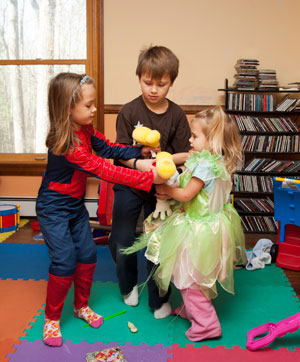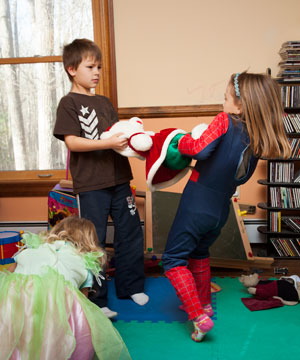The Art of Turn Taking
 The art of the turn taking seemingly runs counter to the fundamental blueprint of the young child. Has anyone heard the toddler credo, “What’s yours is mine and what’s mine is mine!?” There is a natural human affinity for owning and possessing objects. We do start young. In order to deconstruct this we need to first present a positive model of behavior. This starts with the adults in the home modeling actions. These actions should show love and respect for one another.
The art of the turn taking seemingly runs counter to the fundamental blueprint of the young child. Has anyone heard the toddler credo, “What’s yours is mine and what’s mine is mine!?” There is a natural human affinity for owning and possessing objects. We do start young. In order to deconstruct this we need to first present a positive model of behavior. This starts with the adults in the home modeling actions. These actions should show love and respect for one another.
Children can learn relatively early (18 months) that they may be expected to share toys/materials with others. Is it going to be an easy lesson or one that they will learn in one day? The answer is a resounding “No!” In some cases you may need to take away the toy that is causing the disagreement but there is a process that children can learn. This process helps to give power to both children. It encourages each child to learn to recognize that others have needs and desires. It also teaches them that they cannot have what they want, at the exact moment they want it. The transition does not happen overnight and it will take repetition but it will happen. It takes consistency to implement and a willingness not to treat the “repeat offender” as the child always in the wrong. Sometimes one child grabbing a toy from another is a cry for attention and it is important that as adults we remain calm. While it can be hard to do this, remember that your child looks to you to model the type of behavior you want them to follow.
 These are some of the topics that I can discuss with you.
These are some of the topics that I can discuss with you.
- How to enter a charged situation between two children wanting the same toy
- Adults do not own all of the sharing problems that exist. Recognize when the best thing you can do is tell them that you will not play referee. Let them solve their own problems. ( Very difficult but the benefits are great)
- The steps involved in creating a turn taking house hold. Children also become more familiar with lengths of time.
- Your anger in certain situations heighten the “attack” mode in your child and contribute to an environment where yelling is prevalent.